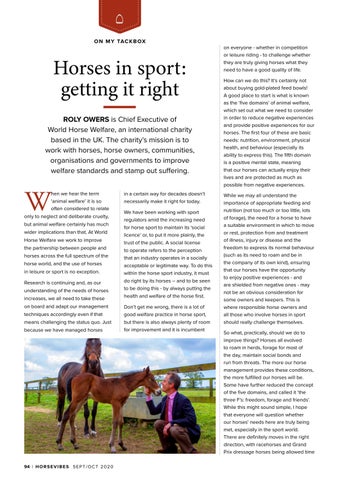O N M Y TAC K B OX
Horses in sport: getting it right ROLY OWERS is Chief Executive of World Horse Welfare, an international charity based in the UK. The charity’s mission is to work with horses, horse owners, communities, organisations and governments to improve welfare standards and stamp out suffering.
W
hen we hear the term ‘animal welfare’ it is so often considered to relate
only to neglect and deliberate cruelty, but animal welfare certainly has much wider implications than that. At World Horse Welfare we work to improve the partnership between people and horses across the full spectrum of the horse world, and the use of horses in leisure or sport is no exception. Research is continuing and, as our understanding of the needs of horses increases, we all need to take these on board and adapt our management techniques accordingly even if that means challenging the status quo. Just because we have managed horses
94 | H O R S E V I B E S S E P T / O C T 2 0 2 0
in a certain way for decades doesn’t necessarily make it right for today. We have been working with sport regulators amid the increasing need for horse sport to maintain its ‘social licence’ or, to put it more plainly, the trust of the public. A social license to operate refers to the perception that an industry operates in a socially acceptable or legitimate way. To do this within the horse sport industry, it must do right by its horses – and to be seen to be doing this - by always putting the health and welfare of the horse first. Don’t get me wrong, there is a lot of good welfare practice in horse sport, but there is also always plenty of room for improvement and it is incumbent
on everyone - whether in competition or leisure riding - to challenge whether they are truly giving horses what they need to have a good quality of life. How can we do this? It’s certainly not about buying gold-plated feed bowls! A good place to start is what is known as the ‘five domains’ of animal welfare, which set out what we need to consider in order to reduce negative experiences and provide positive experiences for our horses. The first four of these are basic needs: nutrition, environment, physical health, and behaviour (especially its ability to express this). The fifth domain is a positive mental state, meaning that our horses can actually enjoy their lives and are protected as much as possible from negative experiences. While we may all understand the importance of appropriate feeding and nutrition (not too much or too little, lots of forage), the need for a horse to have a suitable environment in which to move or rest, protection from and treatment of illness, injury or disease and the freedom to express its normal behaviour (such as its need to roam and be in the company of its own kind), ensuring that our horses have the opportunity to enjoy positive experiences - and are shielded from negative ones - may not be an obvious consideration for some owners and keepers. This is where responsible horse owners and all those who involve horses in sport should really challenge themselves. So what, practically, should we do to improve things? Horses all evolved to roam in herds, forage for most of the day, maintain social bonds and run from threats. The more our horse management provides these conditions, the more fulfilled our horses will be. Some have further reduced the concept of the five domains, and called it ‘the three F’s: freedom, forage and friends’. While this might sound simple, I hope that everyone will question whether our horses’ needs here are truly being met, especially in the sport world. There are definitely moves in the right direction, with racehorses and Grand Prix dressage horses being allowed time

























